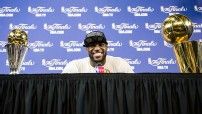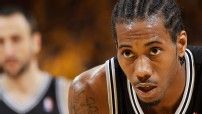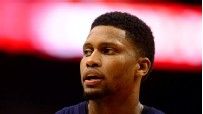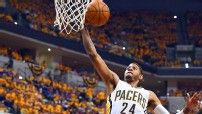This week, our panel of experts will be debating some of the most pressing questions surrounding each position in the NBA. Kicking off the discussion: the small forwards.
1. Who's the best small forward in the NBA?

Jim Cavan, Knickerblogger: This is a little like asking what the best Stone Roses album was; you really only have two choices … but even then, not really. LeBron James has boasted a PER north of 30 for two straight seasons, the only player since Michael Jordan ('87-'91) to do so. That's merely exhibit A in a list that could very well extend through ZZZ. The dude's an alien, and the best there is.
Tom Haberstroh, ESPN.com: LeBron James. I'll still classify him as a small forward for these purposes, but he's functionally a power forward for the Heat. He's the best player on the planet and the only question here is this: Which position is he not the best player?
J.M. Poulard, Warriors World: LeBron James. He is so good right now that he makes guys like Carmelo Anthony and Kevin Durant a complete afterthought at his position. He rates high in scoring, rebounding, passing, defense and swagger, whereas the rest of the league's forwards seem to lack at least one of these components.
Jared Wade, 8 Points, 9 Seconds: Serious question? LeBron. He's not only the best small forward alive but the best player to grace the league since Michael Jordan.
Royce Young, Daily Thunder: LeBron. Kind of hard to argue against the guy who has four MVPs, back-to-back titles and is still just 28 years old. I guess the best argument against might be that in Erik Spoelstra's small ball system, maybe he actually has become more of a hybrid power forward. Then again, pick a position 1 through 5 and you could make the case LeBron is the best at each.
2. Who's the most underrated small forward in the NBA?

Cavan: Kawhi Leonard's breakthrough performance in the NBA Finals should be enough to garner some much-deserved preseason press. Sadly, a combination of prevailing media provincialism and top-heavy nature of the position means he will likely remain under radar. But make no mistake: He is San Antonio's future, and that's a great, great thing.
Haberstroh: Kevin Durant. He might be the most efficient high-volume scorer of all time. He was a member of the 50-40-90 shooting club last season while shooting about 18 shots per game. That's insane. Frame it another way, no one has ever posted a better true shooting percentage while shooting as often as he did. Ever. I'm afraid as long as LeBron is around, KD will be criminally underrated.
Poulard: Kawhi Leonard. The San Antonio Spur is slightly reminiscent of a young Shawn Marion -- mind you his offensive game offers more diversity. Leonard flies under the radar mostly because of where his team plays, but he is one of the best talents at his position in the league.
Wade: Luol Deng. In the mid-2000s, there was an influx of talent at the position led by LeBron and Carmelo Anthony. Among the others who followed, Deng has always maintained a low profile while guys such as Caron Butler, Danny Granger and Rudy Gay received more praise. But today, which of those wings would you want on your team?
Young: Chandler Parsons. He might be the best value in the league (making $926,500 this season), but with numbers of 15.5 points, 5.3 rebounds, 3.5 assists, a solid PER of 15.33 and shooting percentage splits of 49-39-73, Parsons is quietly a top-10 small forward. Maybe top five if you want to get bold about things.
3. Who's the most overrated small forward in the NBA?

Cavan: Rudy Gay. Few players personify the stats-eye test divide better than the supremely talented -- and supremely flawed -- Raptors wing. Where proponents point to Gay's bucket-harvesting prowess and smooth flow, detractors, well, point to the numbers. The good news: after corrective surgery, Gay should actually be able to, like, see the basket. Which is important when you're shooting a basketball.
Haberstroh: I'll go with Rudy Gay, one of the last remaining idols of Points Per Game worshipers. Gay has all the tools to be an All-Star and he's paid like one -- did you know he'll make more than Durant this season? -- but his only above-average skill is shot-taking. Though he may be more overpaid than overrated, he's not the franchise player that many believe he is.
Poulard: Rudy Gay. He will make roughly $17.9 million in 2013-14 and yet does not possess a single elite skill. He can create good shots but one expects a better conversion rate from the Toronto Raptor. His salary technically puts him close to the same level as Carmelo Anthony. But his production? Not so much.
Wade: Rudy Gay. Critics spurned the Memphis Grizzlies for punting on the season last year when they traded away their ballyhooed wing in favor of fiscal prudence. Then the team advanced further than it ever had in franchise history. Despite getting swept by the Spurs, this is damning evidence that Gay was merely an ancillary ingredient in the team's success.
Young: Rudy Gay. In today's NBA, small forward has become a position of production, and not just in raw scoring stats, but efficient, well-rounded production. Gay can score, but it's in a volume manner. He's a good player, no doubt, but is there one thing he's really great at?
4. Who's the most promising small forward in the NBA?

Cavan: Paul George is already a top-tier wing stopper, and has developed enough of an offensive arsenal to give the intermittently anemic Pacers attack something of a reliable perimeter option. The first skill isn't going anywhere, but it's the further development of the second that will determine whether George can make one last leap to superstar territory.
Haberstroh: Tobias Harris. Though he played mostly at the 4 last season, I'll still slot him at small forward because that probably will be his job title once Glen Davis returns to the court. Though the average NBA fan probably doesn't know his name, the 20-year-old averaged 17 and 8 for the Magic last season with a 17.0 player efficiency rating. That's promise.
Poulard: Paul George. One can quibble about his position, but he is a natural forward with tantalizing talent. With added responsibility in 2012-13, he became a little turnover prone but should rectify that with experience. George is a terrific finisher as well as an emerging playmaker who performs on the big stage. By the way, he will still be just 22 years old when the 2013-14 season opens.
Wade: Paul George. After Kawhi Leonard's performance in the NBA Finals, it is tempting to go with the Spurs' rising star, but George still has the higher ceiling. His length, quickness and instincts have devised a defensive menace, and he is still improving as a creator, ball handler, playmaker and shooter. He should be a five-time All-Star by 2017.
Young: Harrison Barnes. He showcased a bit of what he can do in the postseason, but Barnes has the potential to be an elite wing stopper, along with an above-average 3-point shooter with supreme slashing and finishing skills. It's not hard to imagine Barnes as a Luol Deng-ish small forward, except with more athleticism.
5. Who will be the best small forward in the NBA in five years?
Cavan: Kevin Durant. Coming to fitful grips with an inevitable -- though by no means imminent -- LeBron decline is tempered somewhat by the prospects of KD's ascendance, which continues apace. By all accounts, he's just now arriving at his prime at 24. That's both awesome and completely terrifying, depending on whom you ask.
Haberstroh: Kevin Durant. He'll still be in his prime while LeBron will be on the downside of his career. Of course, that assumes LeBron isn't an ageless cyborg. Which may be a dubious assumption.
Poulard: I am tempted to say LeBron, but at some point Kevin Durant is going to overtake him, and five years from now seems like a good bet. Durant is already the second-best player in the league by most accounts and has improved in every single season. In five seasons he will be in his prime and should be then what James is today.
Wade: LeBron James. Though still improving right now, James will likely be on the downslope of his career arc in five years. It won't matter. Nobody will be better -- and if he continues to improve his post game and outside shooting, 2017 LeBron may be nearly as frightening as 2013 LeBron despite a dip in athleticism.
Young: Kevin Durant. Have you been reminded this week that Durant is still just 24 years old? He just registered one of the most efficient scoring seasons in league history, and really, he's just scratching the surface. His handle could be better. He passing could be better. He could be better in the post. He could get stronger. Look at the jump LeBron took from age 23 to 28. Now picture Durant in five years. Are you terrified yet?

 ESPN.com and the TrueHoop Network
ESPN.com and the TrueHoop Network
Tom Haberstroh covers the NBA for ESPN.com. Jim Cavan, J.M. Poulard, Jared Wade and Royce Young are part of the TrueHoop Network.
• Follow the NBA on ESPN on Twitter | On Facebook | On Google+
